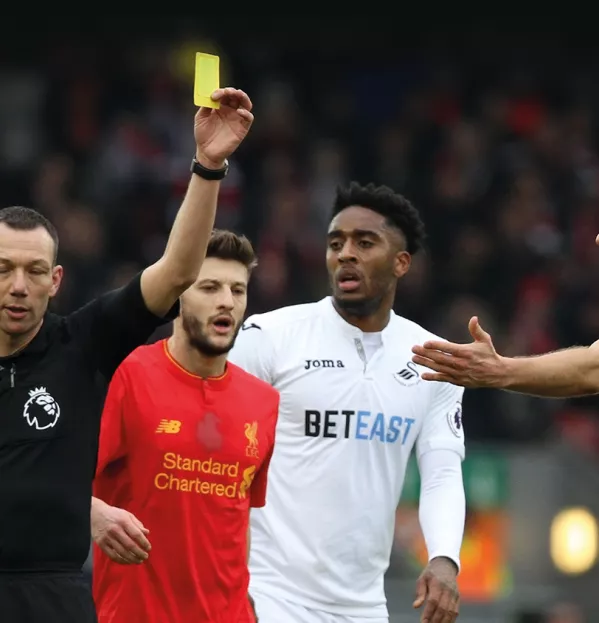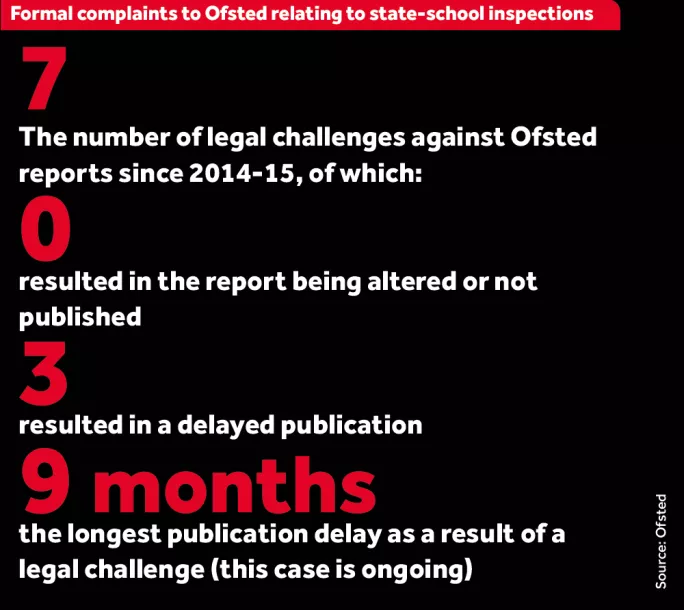Want to try to overrule Ofsted? Don’t bother

A bad Ofsted inspection report can leave a school’s reputation in tatters, cause staff morale and pupil numbers to plummet, and even lead to closure.
So it is not surprising that schools want to overturn critical judgements. But a Tes investigation has established that it is virtually impossible for them to succeed.
Figures obtained from the watchdog through a freedom of information request show that not a single school has successfully changed or quashed an inspection report following a legal challenge in the past three years.
But this poor success rate has not prevented tens of thousands of pounds of taxpayers’ money being spent on court disputes over schools’ Ofsted judgements, with more cases in the pipeline.
The odds are also heavily stacked against schools that attempt to challenge the watchdog using its own complaints process, the investigation reveals.
The latest statistics show that not one state school had its overall judgement overturned in 2015-16 - a year in which 197 state-school inspections resulted in formal complaints.
In 2014-15, just two state schools were successful in changing their overall rating through the complaints procedure; the year before that, there were only three. In both years, more than 400 inspections had formal complaints.
Geoff Barton, general secretary of the Association of School and College Leaders, says: “This exposes an ongoing problem with the complaints process. Too many members still worry about the inconsistency of inspections and the laborious complexity of the complaints procedure.”
Russell Hobby, general secretary of the NAHT headteachers’ union, believes the feeling that Ofsted is “infallible” creates “an aura of fear in the education system”.
“Often we help members with challenges against inspections and we find it very hard to overturn overall verdicts,” he says.
“It’s a principle of justice that every organisation needs to be able to admit that it will get things wrong and have an open process for tackling that.” But could the figures actually be proof that inspectors are generally making the right calls? Ofsted says the data “demonstrates the thoroughness of our inspection and quality assurance arrangements”.
‘Mistakes are made’
Hobby is sceptical. “I don’t think that Ofsted are always getting it right,” he says. “Mistakes are made in any situation.”
Not all schools that complain to Ofsted ask for their overall judgement to be changed. But the watchdog said it did not have the information on how many did make such a request.
A minority of school challenges do succeed in achieving some changes - of the 197 inspections complained about in 2015-16, 37 per cent saw at least part of a complaint upheld, a slightly higher proportion than the previous two years.

And there has also been a significant fall in the annual number of complaints against school Ofsted inspections - a drop of 58 per cent, compared with the 475 of 2013-14.
But Hobby suggests this is partly down to schools becoming disenchanted with the complaints process and coming to the conclusion that challenge is futile.
He hears from despondent members who feel that “there’s no point in complaining and “it’s not worth their while”. “Ofsted has tightened up the complaints processes, and also its attitude towards complaints have got tougher as well,” he says. “It seems to be treated as a defence mechanism.”
Schools that fall at the first hurdle of Ofsted’s complaints process stand only a slim chance of succeeding at the next stage - the “internal review”. And the chances seem to be getting even slimmer.
In 2013-14, 23 per cent of school complaints were upheld or partially upheld after internal review, dropping to 22 per cent in 2014-15 before falling to 17 per cent in 2015-16 - the year when an extra stage of the reviews, new “scrutiny committees”, was introduced.

But a few schools will go to greater lengths. Information obtained by Tes shows that seven schools in the past three years have been prepared to take their complaints beyond Ofsted and take legal action against inspection reports. So far, none has been successful.
But, Barton argues, the action itself demonstrates that there are problems in the system. “If an issue like this gets to the court, it has to be an indictment of the Ofsted process,” he says.
The inspectorate has itself spent £57,840, before VAT, on legal challenges since 2013-14, its FOI response reveals. Ofsted’s legal team “seeks to recover costs wherever possible” from the losing school, the response adds.
There have been calls for the inspectorate to release the evidence base behind inspectors’ findings in reports to help the schools to make their cases against verdicts more effectively. Refusing to do this gives Ofsted an in-built advantage, say critics.
Some schools, however, are still determined to fight inspection reports all the way, despite this perceived handicap.
Durand Academy Trust, in South London, has applied for a judicial review over the findings of a damning report following an inspection last November.
Meanwhile, the publication of inspection findings relating to an Islamic state school referred to in court only as “School X” - branded “inadequate” by Ofsted - has been delayed for nine months, as a long-running legal battle continues. The school is attempting to take its case to the Court of Appeal after losing a High Court challenge last November.
‘Catastrophic consequences’
In addition to the seven schools where legal action has begun, a group of 10 independent Christian schools subject to critical Ofsted inspections last December is “definitely considering” applying for a judicial review.
Andrea Minichiello Williams, chief executive of the Christian Legal Centre, says: “We are not going to let this one go until we have got to the bottom of it.”
The schools, all of which are affiliated to the Christian Education Europe network, were criticised for focusing on creationism and for failing to teach deeply enough about other faiths.
But if the current pattern continues, their action will fail. So are these legal challenges a sensible use of resources - particularly in cases where they involve state schools and taxpayers’ money?
Barton accepts that legal action against Ofsted is not a good use of public funds but says it can come down to “school leaders fighting for what they see is their moral purpose”. “It’s a sign of just how high-stakes our accountability system is,” he says. “Inspections can have catastrophic consequences for school leadership and for the local community.”
Some argue such action can cut across the public interest, by keeping potentially serious findings about schools hidden from public view during the legal wrangling.
One campaigner who has been following the Durand case, and does not wish to be named, says: “It seems a disgrace, and a risk to children, if tactics of judicial reviews can be used to delay remedial interventions, particularly for safeguarding issues.”
Publication has been delayed for three of the seven reports subjected to legal challenges.
An Ofsted spokeswoman says: “We take all complaints seriously and aim to resolve concerns promptly. We are talking a very small number of complaints compared to the overall number of inspections. We will acknowledge if our work has not met our usual high standards and take steps to put things right, including, when necessary, amending reports.
“However, our complaint investigations very rarely find that inspectors reached the wrong overall judgement.”
She adds: “Complaints do lead to some changed judgements.”
You need a Tes subscription to read this article
Subscribe now to read this article and get other subscriber-only content:
- Unlimited access to all Tes magazine content
- Exclusive subscriber-only stories
- Award-winning email newsletters
Already a subscriber? Log in
You need a subscription to read this article
Subscribe now to read this article and get other subscriber-only content, including:
- Unlimited access to all Tes magazine content
- Exclusive subscriber-only stories
- Award-winning email newsletters